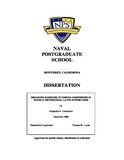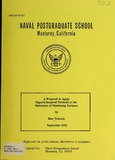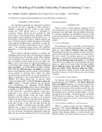Breaking barriers to design dimensions in nearly orthogonal Latin hypercubes

Download
Author
Hernandez, Alejandro S.
Date
2008-12Advisor
Lucas, Thomas W.
Metadata
Show full item recordAbstract
A dynamic and extremely complex landscape in security and world events presents problems that challenge all sectors of society to develop efficient means for exploring a wide range of solutions. Similarly, exponential increases in technological capability make it difficult for commercial and governmental leaders to assess those proposed solutions. Computer experimentation is an established method for examining complex models with large numbers of factors. Orthogonal and nearly orthogonal Latin hypercubes are proven techniques for designing simulation experiments. A key property of these efficient, space-filling designs is their ability to explore many factors within a relatively modest number of design points; however, there is a limited inventory of these designs currently available. Those that have been catalogued are usually computationally expensive to produce and have severe restrictions in the number of factors and/or runs that they allow. To remedy this, we present a set of flexible methodologies to create design matrices with little or no correlation-including saturated nearly orthogonal Latin hypercubes. This new family of designs can explore as many factors as there are design points. This research also addresses experiments that include a mixture of continuous and integer variables, some of which have different numbers of value levels.
Collections
Related items
Showing items related by title, author, creator and subject.
-
A study of the flow of bulk material in bins
Reese, John Warren (Purdue University, 1954);The major problem in handling bulk material in bins is flow stoppage, which is the hanging-up of material within the bin. Although^ there are generalizations as to why materials cease to flow, arch, or funnel, clear ... -
A proposal to apply Taguchi-Inspired Methods to the reduction of machining variance
Trietsch, Dan (Monterey, California. Naval Postgraduate School, 1992-09); NPS-AS-92-021The Probability a Machined part will be defective increases with the variance of the machined dimensions. Even for parts within tolerance, the quality decreases with the variance. By reducing the variance of these dimensions ... -
Risk Modeling of Variable Probability External Initiating Events
Dempere, Jose; Papakonstantinou, Nikolaos; O'Halloran, Bryan; Van Bossuyt, Douglas L. (2017);As Components engineering has progressively advanced over the past 20 years to encompass a robust element of reliability, a paradigm shift has occurred in how complex systems fail. While failures used to be dominated ...


 08Dec_Hernandez_PhD.pdf (891.2Kb)
08Dec_Hernandez_PhD.pdf (891.2Kb)

